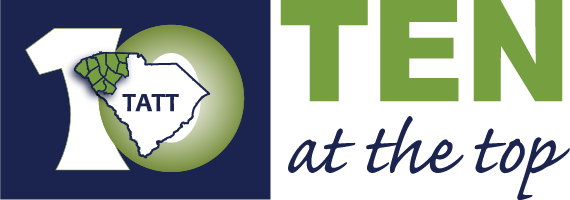
Sep 2, 2020 | Staying on Top, UpstateVibe365
with Sharon Purvis

Ana Parra, Women’s Business Center Program Director, CommunityWorks
Earlier this year, CommunityWorks applied for and received funding from the Small Business Administration (SBA) to be one of two organizations in South Carolina to launch a Women’s Business Center. The CommunityWorks Women’s Business Center (WBC) is a part of a national network designed to help women start and grow small businesses.
Q: Can you tell us a bit about the how CommunityWorks came to house the new Women’s Business Center—was it something CommunityWorks pursued, or was it more of an initiative in search of a home? Or a little of both?
While CommunityWorks had to apply for the grant to fund the center, the organization’s commitment to building opportunities for all through financial education lending and investing made us a natural fit for the WBC. CommunityWorks has seen firsthand the growing number of women business owners in our Upstate community and the need for women to have supportive entrepreneurial ecosystem. With the WBC, we will be able to empower women entrepreneurs, through advocacy, outreach, networking, coaching, and education.
Q: What kinds of programs will be offered to women with the center that are distinct from the other programs offered by CommunityWorks?
The WBC continues the work of CommunityWorks to provide relevant training and resources to women and communities of color. Our focus has always been on reaching and work with those who have been traditionally underserved by traditional banking institutions. The WBC will be offering clients one-on-one support through our CommunityWorks team. The guidance and training offered is designed to build confidence, skills, networks, and access to capital to women, with an intentional outreach to women of color.
Some of those programs include self-paced trainings, business planning using an online platform with the guidance and feedback from the WBC, and business coaching for businesses that have been disrupted by COVID-19.
Q: I know that the Credit Union at CommunityWorks is for people who live or work in Greenville County. Does the Women’s Business Center likewise cater only to Greenville County residents, or is it open to women across the Upstate?
We’re looking forward to working with women all over the Upstate and will be working in 15 counties: Abbeville, Anderson, Cherokee, Chester, Edgefield, Greenville, Greenwood, Lancaster, Laurens, McCormick, Oconee, Pickens, Spartanburg, Union and York.
Q: When will the center be up and running, and what will the first offerings be?
The CommunityWorks Women’s Business Center is open! When clients register with the CommunityWorks Women’s Business Center, they will be able to sign up for business consultation to determine how we can best help them on their business journey—whether that’s support in creating or updating a business plan, personal finance, or business coaching.
We are working on a variety of trainings and webinars to help business owners better respond to COVID-19 depending on what sector they are in, as well as providing technical assistance in areas such as business planning, accounting, marketing, and technology.
Q: What else do you want people to know about the Women’s Business Center?
The CW WBC wants to support business owners at every level. We are here to help with next steps whether you are in the idea phase or growth phase. And if you happen to be a business owner who wants to provide mentorship and network with other small business owners, we want to hear from you too, as we develop a network of women entrepreneurs who represent the Upstate’s diverse communities and a variety of sectors.
We have had such a great response so far and we hope to grow and develop to meet the needs of the amazing women who making the Upstate community a dynamic place to live.

Aug 26, 2020 | Staying on Top, UpstateVibe365

Eliza Hart, Account Executive, Smoak Public Relations
by Eliza Hart, Account Executive, Smoak Public Relations
With the current circumstances surrounding COVID-19, we are without a doubt experiencing a different time and all businesses have had to pivot. The event world is no exception. COVID-19 has forced all events to come to a halt and determining the next steps has been a challenge.
We reached out to some of our friends in the event industry to gather different expert opinions on what they recommend to best help you move forward with your event. Please find the below pointers on how to navigate the event world during such a unique time.
Perspective from the event planner (Smoak Public Relations): As an event planner and account executive at Smoak PR, I suggest using this time to get organized, work ahead and make your event even better! For starters, reach out to your venue and hold several new event dates—request first right of refusal. With the status of COVID-19 ever changing, it is important to have more than one date option and to consider the possibility of a virtual event. The upside of having a virtual event is that you are able to keep your original date and stay connected with your attendees. In addition, you are saving on the majority of event expenses, such as food & beverage, rentals, event signage, and more. However, hosting a virtual event makes it more difficult for networking opportunities to occur and may also result in lower event attendance. You must be very creative if you are hosting a virtual event!
Perspective from the event rental company (Professional Party Rentals): Janice Mancuso at Professional Party rentals gave us some insight on what they are seeing from an event rentals standpoint. She shared, “With events coming to a stop it has resulted in most event rental companies temporarily shutting down. We are getting small orders here and there, but we are no longer running at full capacity. At PPR, sales representatives are only working one day a week; therefore, response time may be delayed. Be sure to stay organized and make a list of everything you need so you can limit the amount you are contacting vendors. It would also be helpful to visit our website, where you most likely will be able to find the answers to the majority of your questions. The website will give you a good idea of what items we have and hopefully provide some inspiration!”
Perspective from the caterer (Southern Way Catering): The general manager of Southern Way Catering, Mark McCalmont shared, “With event dates being rescheduled, we will be busy when things are back up and running; however, in the meantime we are taking a hit. COVID-19 has affected scheduling, food orders and staffing, so share updates with your caterer as soon as you can. Most people who order food to go are picking up from local restaurants rather than ordering meals through a caterer. Most caterers, Southern Way Catering included, have family meal options for any day of the week and especially options for holidays. Use this time to support your caterer and order food to go so you can sample different menu offerings. This is also a great time to check things off your list and finalize your menu and bar package.”
Perspective from the venue (Bon Secours Wellness Arena): According to Joe Dolan, assistant general manager at the Bon Secours Wellness Arena, “the live event, sports, and entertainment industry has been impacted significantly by COVID-19. Our industry was one of the first to cease operation after the spread of the virus, and will likely be one of the last to return as restrictions are lowered. Customer safety and security is at the forefront of every decision we make, so new best practices will be instituted to ensure each guest is comfortable enjoying the unique experiences our events have always provided. Our industry is familiar with adapting to protect our guests, and just as we did post 9/11 and in the age of violence against mass gatherings, we will overcome these new challenges to create a welcoming and safe atmosphere for fans of sports, events, and live music.”

Aug 26, 2020 | Staying on Top, UpstateVibe365

Karen Canup, MBA—COO/CFO, Sherman College
by Karen Canup, MBA—Chief Operating Officer/Chief Financial Officer, Sherman College of Chiropractic
What happens when a “hands-on” education suddenly becomes impossible? Sherman College in Spartanburg, SC, faced this very question when the COVID-19 pandemic reached a critical point this March.
At Sherman College, the only chiropractic college in the Carolinas, adaptation is a frequent topic of discussion. Doctors of Chiropractic help patients achieve optimal health and function without drugs or surgery, using their hands to gently adjust the spine to facilitate health and healing. Because chiropractic takes a preventative approach to healthcare, the body’s ability to adapt to outside stressors and forces is a central concept.
So when Sherman College leaders made the difficult decision to move to a distance-learning format at the end of spring quarter, adaptation had to happen, and fast. The enormity of shifting an entire face-to-face curriculum to a distance learning model cannot be overstated, but we were determined to continue providing the same top-quality chiropractic education we always have.
Thanks to the college’s iPad initiative, the transition went as smoothly as possible. Launched in 2016, iSherman provides every student with an iPad loaded with tools for success—including video tutorials, e-books, course syllabi, and more—at no additional cost. While iPads and other learning technologies have been part of our classrooms for some time now, their use became key to our online transition this spring.
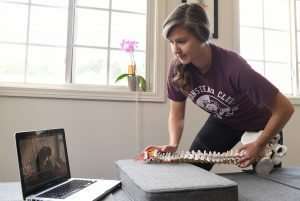
Sherman College-With school being taught on line, Elizabeth Hodges keeps up with her technique class at her home adjusting area watching a video by Dr. Mitzi. May 14, 2020. (John Byrum photo)
Under the guidance of the department of Teaching and Learning, the Sherman College faculty rallied, recording welcome videos, modifying course plans, creating learning modules, scheduling virtual office hours, and developing discussion boards. We issued iPads to our academic support staff members to facilitate online advising and coaching, and we also moved our counseling services online.
Students took the changes in stride. They organized study spaces at home, and they created schedules and time management plans to ensure their success. They kept their clubs going, and they continued to look for ways to help others by collecting food, making face masks, and connecting with seniors in local care facilities.
Sherman College staff adapted quickly to working from home as well. IT assessed needs, issued laptops, and created training programs, all while completing a successful website launch. We shifted our annual homecoming event to a fully virtual platform, which had never been done before, and attracted more than 600 attendees.
The college quickly designed virtual campus visits and created a video tour, as well as an online virtual orientation for new students. We developed an application for students to apply for aid through the CARES Act and assisted students with scheduling challenges. We also launched the Sherman Pride Student Emergency Fund and have since raised more than $30,000 to support students facing financial difficulties.
Because communications have been paramount during this time, we have shared COVID-related updates, developed a brand guide and several new publications, and initiated some lighthearted social media projects like story time with Sherman (employees reading their favorite children’s books) on Facebook and TikTok.
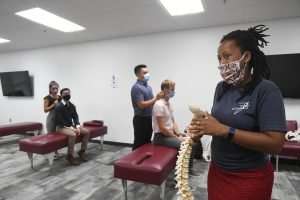
Dr. Princess Porter-Fowler leads a Palpation l class on campus on Tuesday July 28, 2020.
In mid-March, the college made the difficult decision to temporarily close its on-campus Chiropractic Health Center, which serves the Upstate with more than 25,000 patient visits each year. While closed, the Health Center created new safety procedures and ordered plenty of PPE and sanitizing supplies. Since reopening in June, the clinic has expanded its hours of service (Monday–Friday from 9–12 and 2–5) and has again begun welcoming new patients. The clinic maintains careful procedures to provide the safest environment possible for patients, students, and employees.
Sherman is currently operating at stage three of its four-stage reopening plan with safety, security, and student success at the forefront of all college actions. For summer quarter, we remain in a distance-learning module, but we have begun offering limited (and voluntary) live instruction on campus for certain hands-on courses. Fall plans (stage four) are being finalized as we continue to monitor state, local, and national recommendations, but Sherman aims to take a big step toward normal operations by increasing the number of face-to-face classes meeting on campus to about 50 percent.
So while these are indeed times of great uncertainty, Sherman College has chosen to embrace adaptation. Our successes have required flexibility, teamwork, patience and dedication. Despite the circumstances against us, we haven’t slowed down, and we are excited to continue caring for our local community and educating our country’s next generation of doctors of chiropractic. We look forward with great anticipation to what the future holds for Sherman College of Chiropractic as we approach our 50th anniversary in 2023.

Aug 19, 2020 | Staying on Top, UpstateVibe365

Amy Robichaud, Founding Chair, InnoVision Awards
with Sharon Purvis
The InnoVision Awards, established in 1999, recognize innovators in six categories: technology development, technology integration, small enterprise, education, sustainability, and community service, in addition to a young innovators award. This year, in light of the pandemic and the surge of innovation it has produced, a seventh category has been introduced: COVID-19 response.
In a normal year, there are regional forums that culminate in an awards event in November—but this is not a normal year, so we asked Amy Robichaud, founding chair of InnoVision Awards, to tell us about how they are embracing this new world of virtual events.
Q: Your awards event is late in the year (November), which means you’ve had some time to anticipate changes you’ll need to make in order to honor your finalists and winners. Can you talk about how you’ve pivoted to a virtual format for your forums as well as the main event?
The pandemic accelerated innovation for us just as it has for many. The first challenge was presentation of our Forum Series, which has historically consisted of live, in-person events. We successfully transitioned to a live webinar series and changed the focus of the series to “Leadership Beyond the Crisis.” The series explores the challenges and opportunities presented by COVID-19 and the resulting successful pivots executed by some of our 2019 finalists and winners. The stories are impressive and instructive for any time of rapid change and cover numerous types of innovation across the entirety of business functions. (Click here to watch a video of Contec’s pivot story. Upcoming webinars will feature Humimic, Prisma Health and ZVerse.)
Transitioning to a webinar series has actually increased participation for the forum events. Time to travel to live events limited attendance and reach of forums of prior years. Also, we record these webinars and provide replays on our website, increasing the reach of the insights shared by the featured innovators.
Q: The awards event is the culminating event of the year. How are you approaching that in this environment?

Van Robotics was the 2019 InnoVision Award winner for their adaptive robot tutors.
We have been talking with long-time sponsors, former finalists and winners, and those who attended the awards event for the first time last year to understand the value of the experience to them. All left the event with high energy and enthusiasm, inspiration and encouragement, networking and new connections, and valuable connections within the InnoVision community.
We are working on creative approaches to facilitate targeted connections and “organic” virtual networking as naturally as possible—isn’t everyone? Fortunately, several of our board members are attending other virtual events within the next month, so we will have experienced a number of different networking approaches and can combine best practices.
I have often referred to the InnoVision awards event as “watching magic happen”—seeing former winners, board members, or finalists seek each other out after the event to learn more about their innovation, offer guidance or introductions, or talk about potential collaboration. We will likely have to do more homework and orchestrate introductions in advance of the event, but that again will increase the value of the InnoVision experience.
Q: Have you used this time to make other organizational and procedural changes, or to reach new audiences?
This crisis has accelerated change and innovation for all organizations, including InnoVision Awards. Holding virtual events enables us to reach a broader audience. One of our board members has taken on the charge of building our visibility and activity on social media to reach new audiences. In addition to visiting the InnoVision Awards website, you can now follow InnoVision Awards on LinkedIn, Facebook and EventBrite.
We are also collaborating with other local, regional and state organizations to build visibility of, and access to, available resources within the entrepreneurial and innovator ecosystem.
Q: You have a bit of a head start on taking your awards event to a virtual platform in that you already use well-produced videos to introduce the finalists, and those will translate well to an online event. Do you see other advantages to a virtual awards event?
You are so right. The finalists’ and winners’ videos are the backbone and highlight of the event. They provide the energy, the enthusiasm and optimism that everyone carries away with them.
The biggest advantage of a virtual awards event is the ability to deliver that energy, enthusiasm and optimism to a larger, more diverse, more far-reaching audience, and for a longer period of time—on demand.
With the barriers of travel, as well as cost to attend, now removed, students can “attend” and be inspired; a larger number of employees of the honored organizations can participate and celebrate; more family members can join in honoring the value and contributions made by their loved ones; and more communities can take pride in the accomplishments of their local businesses and organizations. The visibility and acknowledgement of the innovators and level of innovation within SC will be greatly increased.
Q: The program is really about the innovators, and innovation is going to be the thing that helps us to beat this virus and get us back to normal—or usher in a new normal. Can you talk about the new COVID-19 category that you’ve introduced this year?
We saw SC companies and organizations rising to the challenges and needs generated by this pandemic. The stories were inspiring and impressive. We wanted to acknowledge organizations that pivoted to assist our communities.
Knowing that the innovations might span a wide swath of needs, we created a COVID-19 Response Award and received close to 20 applications. The range of entries is wide and the independent judges, who reside outside of SC, will likely acknowledge winners in subcategories that could encompass research, new products or services, community support and education.

Aug 19, 2020 | Staying on Top, UpstateVibe365

Paul Clark, Managing Director, VentureSouth
by Paul Clark, Managing Director, VentureSouth
Mental health issues affect 1 in 5 Americans, according to National Alliance on Mental Health data.
Mental health issues have long been recognized as particularly prevalent among entrepreneurs and company founders.
Mental health issues are intensifying as people struggle with physical health, economic dislocation, isolation, and stress during a global pandemic.
Combine these three statements together, and it is not surprising that the mental health of entrepreneurs is facing a challenge of an intensity and scale we have never seen before.
Fortunately, there are two silver linings to this unprecedented combination of stresses. First, founders’ mental health challenges are better recognized than they have ever been. And secondly, right here in the Ten at the Top upstate counties, we have resources and experts to help provide resources to build resiliency and lessen the impact of these challenges on our mental health.
What is mental health resilience?
In mental health circles, resilience is the process of adapting well in the face of adversity, tragedy, or stress. It is the ability to bounce back from challenging experiences and find ways to adapt, control, or modify these experiences. For some fortunate people, it is an inbuilt personality trait, but, for most of us, the good news is building resiliency is a skill that can be learned.
Here in the Upstate, Venture Carolina is a non-profit in Greenville that provides educational materials to entrepreneurs, particularly around methods for raising capital to grow businesses. One of its missions is to help make entrepreneurs more resilient—as that helps companies to persevere, stay in business, and position themselves for raising capital to grow when times improve.
Last year, Venture Carolina partnered with Sharpen, a mental health technology company in Spartanburg to work on the subject of founder mental health. Sharpen provides its technology to several populations of people that need support, including college students, veterans, foster families, and more. Venture Carolina and Sharpen have adapted Sharpen’s resiliency training materials to company founders, through the SharpenFounder platform.
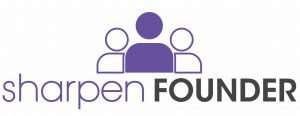
What is the SharpenFounder platform, and how does it create resilience?
The SharpenFounder platform is available for free to entrepreneurs across the TATT region. Clinical studies show that peer-to-peer engagement is a very effective way of having a positive impact on mental health issues.
This is exactly what SharpenFounder provides: peer-to-peer video content of entrepreneurs sharing their stories directly to other entrepreneurs—stories of CEOs responding to “failure”; stories of founders changing their behaviors to avoid stress spiraling into substance abuse; stories of diverse CEOs responding to the specific challenges they face; stories, ultimately, of building resiliency and turning adversity into success.
Sharing the experience that other entrepreneurs gain on their journeys builds resiliency. The platform combines these stories with other clinically supported behavioral health tools, coping strategies, and nourishing techniques. These tools are embedded within a supportive community of other entrepreneurs, reducing the unique stresses of being a founder by sharing them with others. It also includes local and regional resources to help.
Being an entrepreneur was a precarious path before COVID. Now it often seems like an impossible challenge. But with resources like these available to help build resiliency, we are confident the future is bright for founders in our region. We hope you will check it out—and share with us your stories of building your own resiliency in these challenging times.

Aug 12, 2020 | Staying on Top, UpstateVibe365
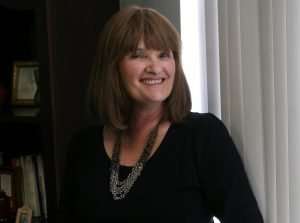
Julie Capaldi, President, United Way of Pickens County
by Julie Capaldi, President, United Way of Pickens County, with Sharon Purvis
South Carolina has landed in the national news with the lifting at the end of July of the eviction moratorium, as the state had the highest eviction rate in the country even before the pandemic, and more than 50% of renting households are at risk of eviction. Affordable housing is an issue that comes up again and again as an intractable problem in both urban and rural counties here in the Upstate.
Upstate non-profits that provide assistance have been stretched thin throughout the last several months. Initially the focus was on food access before stimulus money arrived and unemployment kicked in; the next wave was utility assistance as people continued to struggle to meet their bills, but the moratorium on evictions kept the fear of losing their home at bay. Now the focus will be on rent assistance as families who are teetering on the edge of homelessness seek help.
The United Ways across the Upstate provide the funding to those direct assistance organizations, and they need continued support in order to be able to meet those needs.
Julie Capaldi, president of the United Way of Pickens County, shared the following on the organization’s Facebook page last week. The need, of course, is not just in Pickens County, but the sentiments expressed by Julie are representative of what’s happening all across the Upstate.
Yesterday the need for COVID-19 Recovery Funds just exploded.
BOOM!
First, United Christian Ministries asked me for $10,000 to provide rent assistance for struggling families. Five minutes later, the Salvation Army called and asked for funds to provide rent and utility assistance. They only had $240 left!
When I hand delivered the check to Salvation Army, I was shown the long list of families requesting assistance. I was shocked!
The coronavirus continues to devastate families in Pickens County. Local families still need your help.
Weeks ago, I told you about the impending crisis I was worried about when the rent and utility bills came due. I called it “The Utility Tsunami” because that’s what it felt like. A storm of epic proportions just waiting to erupt.
That Utility Tsunami is HERE, along with a Rent Avalanche, and the needs are staggering.
Many people have not been able to return to work. Stimulus checks are long gone. Large unemployment checks have run out. The bills are due and they can’t pay them.
For hardworking people, the consequences of this pandemic are devastating. They suddenly have no income, a dim future, and many are not surviving.
They need you. You are the only one who can save them.
The pandemic is not done wreaking havoc on our community and people’s lives. It’s only going to get worse and that is why I am asking you to help.
If you have already given, THANK YOU! Please consider giving again. Ask your friends to join you. If you haven’t given, I pray that you will. There are families in Pickens County who will not recover without you.
Please make a secure gift to provide emergency assistance. You will save families and seniors and children. Never has your support meant more to our community.
You will save a family from losing everything.
With Gratitude,
Julie Capaldi
You can donate to your local United Way at the links below:
United Way of Anderson County
United Way of Greenville County
United Way of Greenwood and Abbeville Counties
United Way of Laurens County
United Way of Oconee County
United Way of Pickens County
United Way of the Piedmont (Cherokee, Spartanburg, and Union Counties)
Or you can give to the One SC Fund, which supplements the efforts of the various local United Ways.


